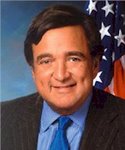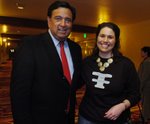This morning at 6:55 MST, Governor Bill Richardson and members of the Save Darfur coalition delegation arrived in Albuquerque after their trip to Sudan. We held a press conference where Governor Richardson spoke about what he saw first-hand the human toll taken by the ongoing conflict in the Darfur region of Sudan as he toured a relocation camp and spoke with citizens forced from their homes and villages by war. The Governor visited the As Salaam IDP (internally displaced persons) Camp in El Fasher, home to more than 43,000 people, mostly women and children.
He also received a briefing from top United Nations officials in Sudan and met with the Commander of the African Union peacekeeping forces, Major General Luke Aprezi. General Aprezi expressed his frustration that the relatively small numbers of AU troops cannot provide adequate security for the 65 IDP camps as well as serving as observers and running patrols to protect civilian activities such as gathering firewood.
In addition, the Governor urged several field commanders from different rebel Sudanese forces to do their part to reduce violence against women and humanitarian workers and to undertake efforts to restore peace and stability to their region and throughout Sudan.
But the most successful part of trip came when he secured a commitment from Sudanese President Omar Hassan Al Bashir to agree to a 60-day cease fire in the Darfur region to allow for a new political process under the Darfur Peace Agreement and the auspices of the African Union and the United Nations.
There's still a long road ahead for the people in the Darfur region but this cease fire is definitely a step in the right direction.
Accompanying Governor Richardson on the trip were 5 members of the Save Darfur Coalition delegation. They were:
David Rubenstien, Coordinator, Save Darfur Coalition
Michael Bergman, Dep. Chair of Mitigating Religious and Ethnic Conflict, Clinton Global Initiative
Ambassador (ret) Lawrence G. Rossin, Senior International Coordinator, Save Darfur Coalition
Kenneth H. Bacon, President of Refugees International
Amjad Atallah, President of Strategic Assessments
********************
Governor Richardson's remarks:
Thank you for being here so early.
I will try to summarize what we have been able to accomplish over the past several days, and then I’d like to ask each member of our delegation to introduce themselves and say a few words as well. Then we’d be happy to take your questions.
First, I would like to thank the members of the Save Darfur Coalition for the important work that they do. For joining my delegation and for paying for this trip.
Usually when I am asked to take on a mission like this it is to help get one or two or a few people out of a dangerous situation. In this case we are talking about millions of people in the Darfur region of Sudan who are victims of a brutal, seemingly endless conflict. They are facing the loss of family members, their homes, and their lives.
During our trip we saw with our own eyes just how desperate the situation is. We met twice with President Omar Al-Bashir and spoke with top officials of his government. We spent a day in Darfur hearing from representatives of the United Nations and African Union, as well as rebel commanders who are fighting this war. We visited one of the camps for those left homeless by the war, and met some of the courageous Sudanese people caught up in this human tragedy.
I believe we made important progress on this trip, and took some critical steps toward finding a solution that will provide a lasting peace for the people of Darfur, and all of Sudan.
Most importantly, we got a commitment from President Bashir and the leaders of the rebel factions for a 60-day cessation of hostilities. This is critical. Before more African Union and UN troops can provide effective protection for the people of Darfur, there must be a cease-fire. You can’t have peacekeepers if there is no peace to keep.
The cease-fire will give the African Union and the United Nations an opportunity to build a framework for the political process to address the remaining differences between those who signed the Darfur Peace Agreement, or D-P-A, and those who did not.
President Bashir reaffirmed his commitment, as he had agreed with the UN Secretary General, under the DPA, to allow the deployment of UN personnel and equipment into Darfur.
We reiterated that sexual violence must be condemned and prosecuted no matter which party or organization is responsible, and the government agreed to extend existing efforts to support Sudanese women against all gender-based violence.
We got an agreement from the government not to paint their military aircraft white, the same as the aircraft of the UN and other relief agencies, and we underscored the need to disarm all armed groups, in particular the government-supported janjaweed militia.
The President agreed to have government forces improve security conditions in all areas of Darfur and provide protection for humanitarian convoys and workers.
President Bashir also agreed to cut the red tape for humanitarian workers in Sudan, and he agreed to allow and facilitate the travel of journalists from around the world to report on the situation in Darfur.
And, importantly, President Bashir has opened a dialogue with the Save Darfur Coalition and committed to building that relationship, toward the goal of ending the violence in Darfur and achieving a lasting political solution to the crisis.
I believe we have opened the door for the peace process to take hold and move forward. It is now up to the leaders of the UN and AU to monitor and ensure implementation by the Sudanese government and rebels, and to use this opening to pursue the durable political solution that will end the tragedy afflicting the people of Darfur.
***************
Please visit: :: :: Gov Bill Richardsons Online Ops Team's diary :: :: on Daily Kos
Special thanks to the marvelous Joaquin Guerra for fielding questions today on the Kos Diary and for taking his time to chat with readers -- muchas gracias, Joaquin!










No comments:
Post a Comment